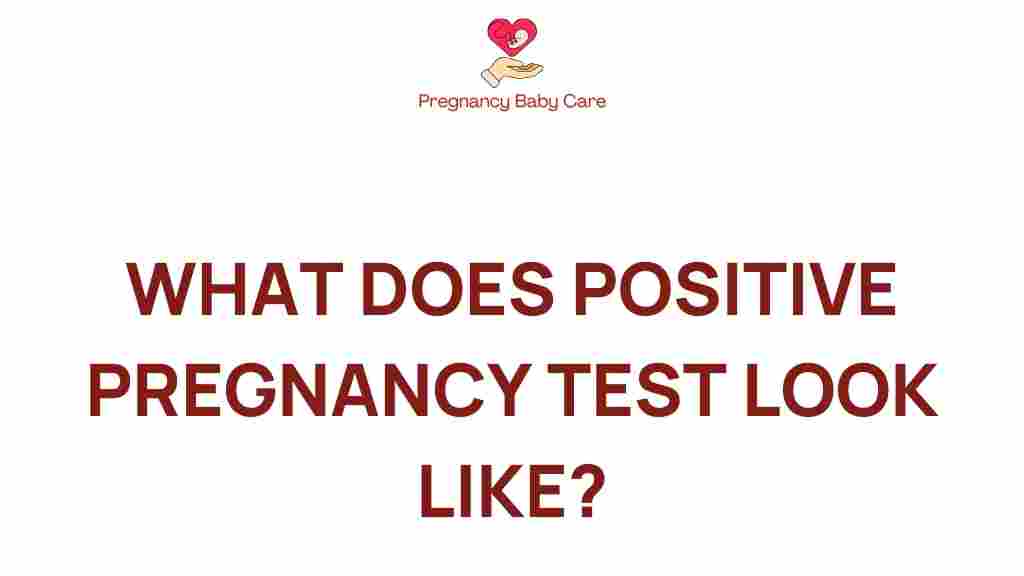What Does a Positive Pregnancy Test Reveal About Your Future?
Receiving a positive pregnancy test result can evoke a whirlwind of emotions and expectations. For many, this moment is filled with joy and excitement, while for others, it might bring uncertainty and apprehension. Understanding what a positive result means goes beyond just confirming pregnancy; it opens the door to a myriad of possibilities regarding health, fertility, and future planning. In this article, we will explore the implications of a positive pregnancy test, delve into early signs and symptoms of pregnancy, and discuss the emotional and health aspects that accompany this significant life change.
Understanding a Positive Pregnancy Test
A positive pregnancy test indicates that the hormone human chorionic gonadotropin (hCG) is present in your urine. This hormone is produced shortly after a fertilized egg attaches to the lining of the uterus. Here’s what you need to know:
- Timing of the Test: It’s recommended to take a pregnancy test after a missed period for the most accurate results.
- Home Testing: Home pregnancy tests are widely available, affordable, and simple to use. Following the instructions carefully is crucial for accurate results.
- Follow-Up Testing: If you receive a positive result, consider scheduling a visit with your healthcare provider to confirm the pregnancy through blood tests or ultrasound.
Early Signs and Symptoms of Pregnancy
In addition to a positive pregnancy test, many women experience various pregnancy symptoms in the early stages. Recognizing these signs can help you understand your body better:
- Missed Period: The most common early sign of pregnancy.
- Nausea and Vomiting: Often referred to as morning sickness, this can occur at any time of the day.
- Fatigue: Increased levels of progesterone can lead to tiredness.
- Breast Changes: Tenderness, swelling, or changes in the areola can occur.
- Frequent Urination: As the uterus expands, it can press on the bladder.
- Mood Swings: Hormonal changes can result in emotional fluctuations.
Health Considerations After a Positive Test
Once you receive a positive pregnancy test, it’s essential to focus on your health. Here are some health considerations to keep in mind:
- Nutrition: Begin taking prenatal vitamins, which include essential nutrients like folic acid to help prevent birth defects.
- Regular Check-Ups: Schedule regular visits with your healthcare provider to monitor the health of both you and the baby.
- Avoid Harmful Substances: Refrain from alcohol, smoking, and other substances that could harm fetal development.
- Stay Active: Engage in moderate exercise unless advised otherwise by your healthcare provider.
Fertility and Conception Insights
Understanding your fertility and the conception process can provide valuable insights into your pregnancy journey:
- Ovulation Tracking: Knowing your ovulation cycle can help in planning for pregnancy. Tools such as ovulation predictor kits can assist in identifying your fertile window.
- Regular Menstrual Cycle: A regular cycle often correlates with regular ovulation, which can make conception easier.
- Underlying Health Conditions: Conditions like PCOS or endometriosis can affect fertility and may require medical attention.
The Emotional Impact of a Positive Pregnancy Test
The emotional impact of receiving a positive pregnancy test can be profound. Here are some common feelings and ways to cope:
- Joy and Excitement: Many women feel overwhelming happiness at the prospect of becoming a parent.
- Fear and Anxiety: Concerns about the future, health, and parenting can lead to anxiety. It may help to talk to someone about your feelings.
- Support Systems: Engage with partners, family, or friends for emotional support throughout your pregnancy journey.
Managing Expectations
Having a positive pregnancy test sets the stage for numerous expectations, both realistic and unrealistic. Here’s how to approach them:
- Understand Variability: Every pregnancy is unique. Some women have symptoms, while others do not.
- Educate Yourself: Gather information about pregnancy and childbirth to set realistic expectations.
- Stay Flexible: Be prepared for unexpected changes and challenges throughout your pregnancy.
Troubleshooting Common Concerns
After receiving a positive pregnancy test, you may have questions or concerns. Here are some troubleshooting tips:
- False Positives: If you suspect a false positive, retest after a few days or consult your healthcare provider for a blood test.
- Confusion About Symptoms: Not all symptoms indicate pregnancy. If you’re unsure, consult a healthcare professional.
- Emotional Distress: If anxiety or depression arises, consider reaching out to a mental health professional for support.
Conclusion
A positive pregnancy test is more than just a confirmation of pregnancy; it signifies a transformative journey that encompasses emotional, health, and lifestyle changes. By understanding the implications of your test result, recognizing early signs and symptoms, and addressing health and emotional considerations, you can navigate this exciting yet challenging time with confidence. Remember, every pregnancy is unique, and seeking support from healthcare providers and loved ones is crucial. Embrace the journey ahead, and prepare for the wonderful experiences that await you on the path to parenthood.
For more detailed information on pregnancy health and wellness, visit this resource. If you’re looking for tools to track your ovulation and fertility, check out this link.
This article is in the category Pregnancy and created by PregnancyBabyCare Team
